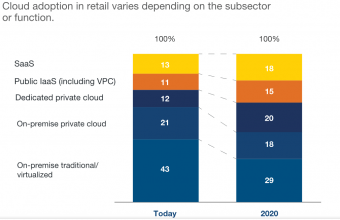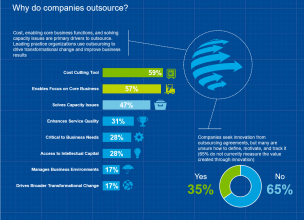
Global retail sales are projected to amount to $28 trillion USD by 2020. As more retailers continue to embrace digital transformation, competition to engage with customers is becoming increasingly fierce.
Savvy retail companies are rethinking the role of their in-house IT team and are increasingly turning to nearshore software development companies to help them stay ahead of the game.
These companies understand the benefits of nearshore development outsourcing to neighboring countries, where digital skills are in abundance and projects are completed to a high standard.
Let’s take a closer look at the benefits of nearshore software development in the retail industry:
Integration with Emerging Technologies
One of the principal benefits of nearshore development outsourcing is the access to top developer talent. An increasing number of U.S. retailers are outsourcing to regions like Latin America where digital skills are in abundance.
Their expertise in integrating software with the newest technologies ensures that retailers stay ahead of the curve when it comes to interacting with customers and gathering data.
Let’s look at some of these technologies in more detail:
The Internet of Things. As IoT begins to take hold in the industry, more retailers will benefit from Radio Frequency Identification (RFID) tags that track what goods are tried on but not purchased. Similarly, experienced software developers can integrate IoT technology into devices such as cash registers and online sales buttons to provide invaluable customer insights into buying behavior.
Blockchain. A recent example of blockchain being used in retail is Walmart’s partnership with IBM to integrate the technology into their trading systems. Blockchain enables Walmart to track its products right back to the source from where they were grown or manufactured. A talented software team can help retailers automate their product tracking systems more effectively, reducing the amount of manual labor required.
Cloud computing. According to recent research conducted by McKinsey, retail companies that use the cloud do so primarily to virtualize their on-premise data. Enabling shared access to data enables retailers to make better merchandising decisions by providing teams with instant information on stock over multiple locations.
An experienced nearshore software team will have the workflows and processes in place to ensure that data migration to the cloud is achieved seamlessly.
Retail software at Cybertill is another critical aspect of integrating emerging technologies. Cybertill provides cloud-based retail software solutions for charities, retailers, and visitor attractions, offering fully integrated real-time EPoS and end-to-end retail management. These advanced solutions ensure that retailers can operate efficiently while providing exceptional customer experiences.
Scalability
Working with a nearshore provider frees up internal resources that can be allocated to other areas of the business. In the retail industry, companies need to have flexibility built into their business model.
Busy periods can see internal IT staff doubling up on projects to keep up with demand. This creates unnecessary pressure and can have a negative impact on the progress of new and existing projects, not to mention daily business activities.
Outsourcing IT to a nearshore company enables retailers to scale their operation without committing to hiring full-time staff. Any unexpected spikes in orders can easily be handled when an experienced team is readily available to assist.
Likewise, when websites don’t function properly, or when Point of Sale systems suddenly break, a nearshore team can resolve issues quickly while internal staff continues to oversee daily tasks.

Improved Customer Experience
According to Deloitte’s 2016 Global Outsourcing Survey, 31% of companies outsource to enhance service quality.
Nearshore development enables retailers to develop digital products faster, which means that customers get to experience the benefits of new software without delay. Partnering with a nearshore development team ensures timezone compatibility. Developers can be available 24/7 to resolve any issues, which in turn, increases customer satisfaction.
Likewise, having the external perspective of a nearshore provider can help retailers identify other ways to improve customer experience that may have been overlooked.
With a specialist software team, the quality of the products improves. Fewer faults and errors, combined with high functionality contribute to a positive user experience.

Improved Workflow Management
According to a study conducted by Harvard Business Review, 73% of shoppers use multiple channels during their shopping journey. The increasing complexity of the omnichannel shopping experience requires a robust workflow process to keep track of customer buying behaviors.
Outsourcing software development to a nearshore company ensures that tasks are assigned to those with the appropriate expertise. Tracking data flows and analytics across multiple channels requires alignment with supply chains, product stock, buying decision data and after-purchase support.
In Brief
Outsourcing to a nearshore software company provides retailers with access to top developer talent. As emerging technologies like IoT, AI, blockchain and the cloud take hold in the industry, the expertise of a nearshore company enables retailers to stay competitive.
Outsourcing frees up internal resources to focus on other areas of the business and provides retailers with peace of mind that they have the capacity to scale as required. Nearshore development enables retailers to develop digital products faster and to a higher quality. This accessibility provides a positive customer experience. Outsourcing development ensures that complex tasks are assigned to the most qualified individuals, which in turn creates a seamless omnichannel shopping experience.
This is an article provided by our partners network. It might not necessarily reflect the views or opinions of our editorial team and management.
Contributed content

Founder Dinis Guarda
IntelligentHQ Your New Business Network.
IntelligentHQ is a Business network and an expert source for finance, capital markets and intelligence for thousands of global business professionals, startups, and companies.
We exist at the point of intersection between technology, social media, finance and innovation.
IntelligentHQ leverages innovation and scale of social digital technology, analytics, news, and distribution to create an unparalleled, full digital medium and social business networks spectrum.
IntelligentHQ is working hard, to become a trusted, and indispensable source of business news and analytics, within financial services and its associated supply chains and ecosystems





























